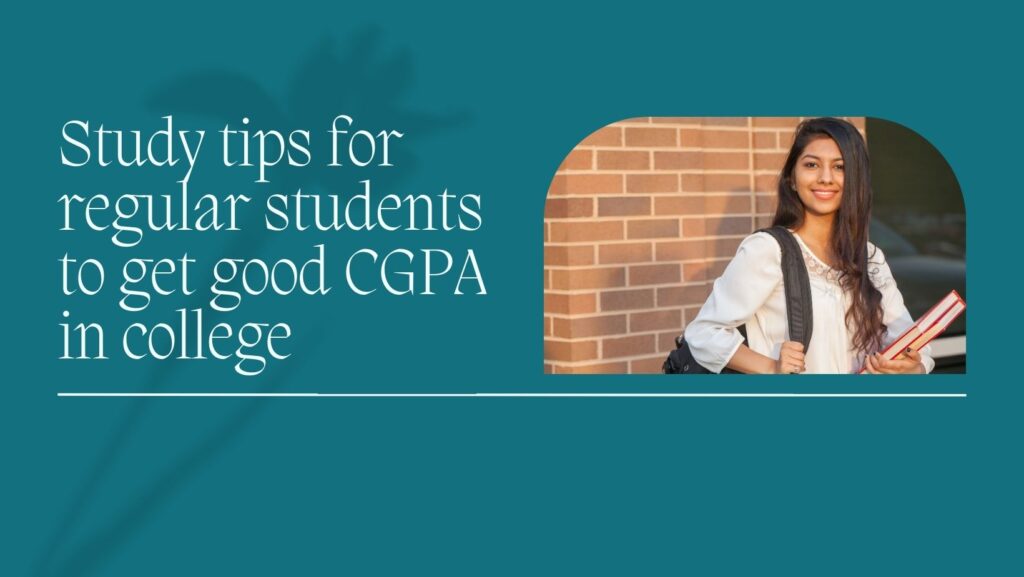After Class 10 and Class 12 board exams, college exams in India are often seen as the last step for students before they step into their career lives finally. The Cumulative Grade Point Average (CGPA) is not simply a numerical representation of your academic prowess. It is seen as a golden ticket to unlocking some of the best career opportunities in placements and getting admissions in the most coveted Master’s programs in India and abroad.
For those who are aspiring to achieve a CGPA of 8+ in college exams in India, the path might seem too challenging. We bring you the best study tips and strategies to achieve this feat easily, without much hard work or stress.
Why is CGPA in college exams in India important?

You are expected to maintain a high CGPA in college exams in India for various reasons:
- It’s a passport to the most coveted career opportunities. Most good companies have a benchmark of 8 or 8.5 CGPA. If you have less than their established standard, you do not get a chance to showcase your skills. Hence, maintaining a good CGPA in college exams in India allows you better chances at some of the most sought-after jobs in Indian companies as well as MNCs.
- Elite Master’s programs and scholarship programs in India and abroad often demand a good academic standing. If you want to pursue higher education, an 8+ CGPA can open up many gates for you.
5 Study Tips for Regular Students to Achieve 8+ CGPA
1. Mindset Matters: One of the top study tips for regular students is that you must have a clear motivation to study well. It could be internships in top tech giants (like Google and Meta) or summer change programs or the dream of studying abroad (for higher education).
When you aspire for clear, achievable goals, you do not merely study to pass exams. You pursue excellence – and that’s what matters in the end.
2. Study Selectively: College students in India face one big problem. The syllabus is too vast, especially in the first year of their undergraduate program. Not all of these subjects are directly relevant to their end career goals. In such cases, students lose interest in these subjects and do not want to study them.
But students, of course, can’t ignore subjects that they consider irrelevant if they want to maintain their CGPA. In this case, they should study selectively. They can identify important topics and crucial concepts and study them more instead of drowning in the entire syllabus. Their goal should be to get more marks in the least amount of time for these subjects.
Following this strategy, they can free up more time to focus on subjects, chapters, and topics they find more relevant and are more interested in.
3. Classes: One of the most popular yet cliched study tips for regular students in college is that they should attend classes diligently. Professors often provide targeted information – one that is most relevant for students and is most likely to be asked in exams.
Making notes during lectures (and writing them in a fair copy after class) allows students to get concise study material for effective revision during exams. These notes cover the most important topics – and often, the most important questions students should study for exams.
They can be very helpful in maintaining a good CGPA in the college exams in India.

4. Relationship with Professors: Irrespective of how much fun you make of students favoured by professors, the truth remains that when it comes to acing college exams in India, having good relations with professors can be a great help.
Unlike board exams, in colleges, professors have a big say on how many marks you get. If you attend classes regularly and submit your assignments on time, they will view you as a ‘good student’ and are more likely to be more lenient while marking your papers.
Being attentive in class, asking questions once in a while, and seeking their guidance and clarifications outside of class hours once a month or so – are good ways to show your professors how you value them as your teacher.
5. Books: Related to the study tip we have mentioned above, do not try to buy and cram too many books in college. Toppers say that if you concentrate on class notes, you are likely to score more in semester exams. These class notes encapsulate key points of the study material and cover the most important topics and questions for the exam.
Refer to books only if professors recommend them for certain topics or questions – or to clarify your doubts. Most study experts agree that textbooks in college are only used for reference purposes.
If you want a CGPA of 8 or more, these five study tips for regular students should make it a breeze for you.
10 Study Strategies for Backbenchers with Active Social, Co-Curricular, and Extra-Curricular Life
Not all students can attend classes regularly. Some want to enjoy it with friends. Some participate in co-curricular or extra-curricular activities – and they work like magic for their holistic development. However, even if you are a backbencher, these study strategies can help you get a high CGPA too:
1. Interact with Immediate Seniors: If you are an extrovert, we will suggest you build a good relationship with your immediate seniors. For example, it is very likely that the first-year experiences are still fresh in the minds of second-year students. They can tell you which subjects are easy, which are more challenging, and which topics or portions are important from the exam point of view.
Also, possibly, your immediate seniors studied with the same teachers that are going to teach you. They can share their preferences and expectations – and even warn you which teachers are not to be messed with.
2. Assignment Matters: One of the study strategies for backbenchers that they should always remember is that whether they attend classes or not, they must complete their assignments on time.
In the overall evaluation, professors award you 10-20 marks for your assignments and attendance. If you submit your assignments within the deadlines, you are likely to net these marks easily. They can impact your CGPA significantly.
3. Never Miss Labs: You might bunk classes but never bunk your labs. They offer you practical knowledge. You experiment (or do coding), note down your observations, and write lab reports. Skipping any of these can affect your lab exams.
If you bunk classes, you can ask for notes from your classmates later. But if you miss labs, that knowledge is lost forever.
Active participation in labs allows you to grasp concepts easily – helping you to understand their theoretical part more easily and helping you acquire skills you will need in your future careers.
4. Start Early: Backbenchers are prone to procrastination. They keep postponing their exam preparation until one night before the exams. But if you want to get a good enough CGPA in college exams in India, we advise you to initiate your exam prep well in advance – at least one week before the mid-sem exams and two weeks before the final semester exams.
5. Prefer Notes Over Books: As we mentioned in the study tips for regular students, rely on class notes over textbooks. Class notes mirror your teacher’s approach and style. If you answer in the way they have been teaching in class, it’s more likely that you’ll get better marks.
If you do not attend your classes regularly, befriend some toppers and ask them to share their notes with you. Class notes should be the staple of your exam prep – and that’s undebatable!

6. Go Through Previous Years’ Papers: Whether you are preparing for competitive exams or college exams in India, you can never go wrong with going through previous years’ question papers – before you start studying as well as after you finish your syllabus.
Going through past years’ papers before you start studying gives you an insight into which chapters and topics carry more weightage and which types of questions are asked in the exam.
After you complete your course, try solving them. This will help you assess your exam readiness and give you the much-required practice.
Don’t forget…in college exams in India, questions are often repeated. Solving previous years’ papers might allow you to work on questions that may appear in your exams as it is.
7. Group Studies = Group Masti: If 8+ CGPA is your goal, do not go for group studies – especially during the last stretch of your exam preparation. You might end up having fun with your friends and wasting precious time.
Instead, choose to study alone or in a library where you can focus on individual preparation.
If you still want to study in a group, divide chapters among friends. Say you are three friends and you have to cover 12 chapters. Let each friend prepare four chapters each and then, study in a group and let each friend share and discuss notes of chapters they have prepared. This strategy might work better if you have too little time left for your upcoming test.
8. Go Through Exam Instructions Carefully: You might be surprised how many students get lower marks because they miss a question or two failing to turn the sheet over to see on its other side!
Or they answered all the eight questions in the sheet even though they only had to answer six! It’s a waste of their precious time during an exam and doesn’t help in winning them more marks.
So, read and understand exam instructions carefully. Go through it twice. Read each question carefully and understand exactly what you need to do with it. Oversight can lead to disasters when it comes to CGPAs.
9. If You Don’t Know an Answer, Write Something: One of the very popular study strategies for backbenchers is that they must answer every question. If you have to answer four questions and you know only three, attempt a fourth one – even if you only go on to write on a similar topic.
Many times, professors award partial marks if you do write something. So, go for it.
Also, present answers in bullet points – for greater clarity. If you are writing a 3-marks question, mention at least three bullet points. This helps the professor to quickly check what you have written about.
Text blocks or walls are difficult to read – and might make you lose marks unnecessarily.
10. Avoid Helping Others Unwisely: In college, friends might seem like your life. But be cautious while sharing your assignments.
We have seen friends who have copied assignments exactly – even to the cover page! BCA students who do the exam with the same coding and the same outcomes; MBA students with case studies that are exactly the same word-to-word; and whatnot.
Remember, the person who shared the assignment with his/her friend is also penalised for cheating as the person who ‘copied’ it. Hence, maintain academic integrity and do your own assignments.
So, here we are – with top study tips for regular students and the best study strategies for backbenchers who want to achieve 8+ CGPA in college exams in India.
Cheers to acing those exams and making the most of your college journey!





